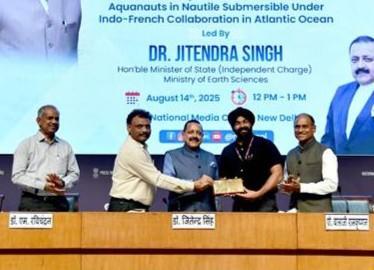
India’s 1st-ever Aquanauts Go Up to 5,002 Metres Deep in Record Dive in Atlantic Ocean
In a remarkable feat of human endurance and technological advancement, India has successfully completed its first-ever deep ocean expedition, with two aquanauts reaching unprecedented depths in the Atlantic Ocean. Senior Scientist Raju Ramesh and Commander (Retd) Jatinder Pal Singh ventured into the unknown, breaking new ground by going up to 5,002 metres deep, the deepest any Indian has ever gone underwater. This monumental achievement was announced by Union Minister Dr Jitendra Singh, marking a significant milestone in India’s scientific and exploratory pursuits.
The maiden dives, undertaken over a total of about seven hours, were a testament to the country’s growing capabilities in underwater exploration and research. The expedition was carried out at depths of 4,025 metres and 5,002 metres, respectively, in the Atlantic Ocean, pushing the boundaries of human exploration and expanding our understanding of the ocean’s vast expanse.
The Indian aquanauts’ incredible feat is a significant achievement, not only for India but for the global scientific community as well. It highlights the country’s commitment to advancing our knowledge of the ocean and its ecosystems, as well as its ability to push the limits of human exploration. The success of this expedition is a testament to the dedication and expertise of the Indian scientists and researchers involved in the project.
The Indian aquanauts’ dive was part of the country’s efforts to expand its underwater exploration capabilities, which began several years ago. The Indian Navy, in collaboration with the National Institute of Ocean Technology (NIOT), has been working on developing advanced underwater exploration technologies, including remotely operated vehicles (ROVs) and autonomous underwater vehicles (AUVs).
The expedition was made possible by the Indian Navy’s advanced research vessel, the INS Sagar Aditya, which was specifically designed for deep-sea research and exploration. The vessel is equipped with state-of-the-art equipment, including ROVs and AUVs, which enabled the aquanauts to collect valuable data and samples from the ocean floor.
The Indian aquanauts’ dive was not without its challenges, however. The extreme pressure and darkness of the deep ocean required specialized equipment and training to ensure the safety of the divers. The expedition also required careful planning and coordination, involving a team of experts from the Indian Navy, NIOT, and other organizations.
The data and samples collected during the expedition are expected to provide valuable insights into the ocean’s ecosystems, geology, and climate. The information will also help scientists better understand the impact of human activities on the ocean and its ecosystems, as well as the potential effects of climate change on the world’s oceans.
India’s achievement in deep ocean exploration is expected to open up new opportunities for research and discovery, as well as provide a platform for the country to showcase its scientific and technological capabilities to the world. The success of this expedition is a testament to the country’s growing reputation as a leader in scientific research and exploration.
In conclusion, India’s first-ever aquanauts’ record-breaking dive in the Atlantic Ocean is a remarkable achievement that demonstrates the country’s capabilities in underwater exploration and research. The expedition has opened up new avenues for scientific discovery and has the potential to contribute significantly to our understanding of the ocean and its ecosystems. As India continues to push the boundaries of human exploration, we can expect even more exciting developments in the field of underwater research and discovery.






